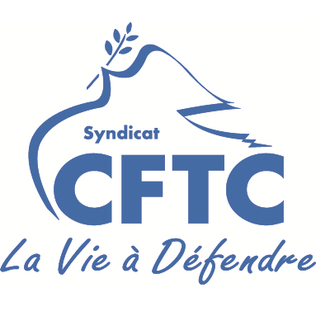Related Research Articles
A trade union, often simply referred to as a union, is an organization of workers intent on "maintaining or improving the conditions of their employment", such as attaining better wages and benefits, improving working conditions, improving safety standards, establishing complaint procedures, developing rules governing status of employees and protecting the integrity of their trade through the increased bargaining power wielded by solidarity among workers.

The World Federation of Trade Unions (WFTU) is an international federation of trade unions established in 1945. Founded in the immediate aftermath of World War Two, the organization built on the pre-war legacy of the International Federation of Trade Unions as a single structure for trade unions world-wide. With the emergence of the Cold War in the late 1940s, the WFTU splintered, with most trade unions from the Western-aligned countries leaving and creating the International Confederation of Free Trade Unions (ICFTU) in 1949. Throughout the Cold War, membership of the WFTU was made up predominantly of trade unions from the Soviet-aligned and non-aligned countries. However, there were notable exceptions to this, such as the Yugoslav and Chinese unions, which departed following the Tito-Stalin and Sino-Soviet splits, respectively, or the French CGT and Italian CGIL unions, who were members. With the end of the Cold War and the dissolution of the Soviet Union, the WFTU lost the largest portion of its membership and financial support. Since the start of the 2000s, the organization shifted headquarters to Athens and recruited new members, claiming to have grown from representing 48 million workers in 2005 to 105 million in 2022.

The General Confederation of Labour is a national trade union center, founded in 1895 in the city of Limoges. It is the first of the five major French confederations of trade unions.

The French Confederation of Christian Workers is one of the five major French confederation of trade unions, belonging to the social Christian tradition.

The Solidaires or Solidaires Unitaires Démocratiques (SUD) is a French group of trade unions.

Trade Unions in India are registered and file annual returns under the Trade Union Act (1926). Statistics on Trade Unions are collected annually by the Labour Bureau of the Ministry of Labour, Government of India. As per the latest data, released for 2012, there were 16,154 trade unions which had a combined membership of 9.18 million. The Trade Union movement in India is largely divided along political lines and follows a pre-Independence pattern of overlapping interactions between political parties and unions. The net result of this type of system is debated as it has both advantages and disadvantages. According to the data submitted by various trade unions to the Ministry of Labour and Employment as part of a survey, INTUC with a combined membership of 33.3 million, has emerged as the largest trade union in India as of 2013.

The Confederation of Professional Employees is a national trade union centre, the umbrella organisation for 13 trade unions in Sweden that organise professional and other qualified employees in both the private and the public sectors. The affiliated trade unions represent about 1.1 million employees. In 2018, the TCO affiliated unions made up 37% of all active trade union members in Sweden, making the confederation the second largest of Sweden's three major confederations. The largest TCO affiliate is Unionen with 551,000 active members in 2018. TCO is independent and not affiliated to any political party in Sweden. TCO is an affiliate of the European Trade Union Confederation and Eurocadres.

The World Confederation of Labour (WCL) was an international labour organization founded in 1920 and based in Europe. Totalitarian governments of the 1930s repressed the federation and imprisoned many of its leaders, limiting operations until the end of World War II. In 2006 it became part of the International Trade Union Confederation (ITUC), ending its existence as an independent organization.
Labour unions emerged in Japan in the second half of the Meiji period, after 1890, as the country underwent a period of rapid industrialization. Until 1945, however, the labour movement remained weak, impeded by a lack of legal rights, anti-union legislation, management-organized factory councils, and political divisions between “cooperative” and radical unionists.
Community is a British trade union which formed in 2004. The union represents workers in a diverse range of sectors, including iron and steel, justice and custodial, domestic appliance manufacturing, textiles and footwear, road transport, betting, the third sector, education and early years as well as the self-employed.
Unions have been compared across countries by growth and decline patterns, by violence levels, and by kinds of political activity.

The UHM Voice of the Workers is a national trade union center in Malta. It was founded on 29 September 1966, under the name Malta Government Clerical Union (MGCU), and changed its name in 1978 to UHM. The union has members in both the private and public sectors, and emphasizes its political independence. This derives from the polarisation of the political set-up that affects trade unionism in Malta. Amongst the founder members of the Malta Workers Union (UHM), Salvino Spiteri and Maurice Agius respectively were the Union's first President and Secretary General.
The Confederation des Travailleurs Haïtiens (CTH) was founded in 1998 to provide a space for Haitian workers to organize collectively and promote a progressive agenda, such as opposing the privatization plans of international financial institutions. Trade unionists of the CTH are based in numerous professions, such as education, artisan work, informal sector, port authority, transportation, and as pastors working in rural areas with church coalitions. They have two offices in Port-au-Prince and one office in each of Haiti's ten departments.
Disunited and poorly organized for most of its history, trade unions in Ecuador developed only slowly and had only a marginal political impact. Precise figures on unionization in the late 1980s were practically nonexistent, even within the unions themselves. The organized labor movement in Ecuador was divided into four confederations and a number of independent federations. At the local level, labor organizations also took the form of artisan guilds, cooperatives, and neighborhood associations. In addition to representing only a minority of the workers in all sectors of employment, the labor movement traditionally was weakened by rivalry and government repression. Nevertheless, it had influence disproportionate to its numbers as a result of the concentration of trade unions in urban areas, mainly Quito and Guayaquil, its organizational power, and the political impact of strikes and demonstrations on governments that did not enjoy strong support.
Established in Istanbul in 1952, the Journalists Union of Turkey to represent journalists and media workers is the oldest and the biggest trade union organisation for journalists in the media industry in Turkey.
Aimé Auguste Tessier, known as Gaston Tessier was a French trade unionist and Resistance member.
The Federation of State Establishments and Arsenals is a trade union representing workers in the defence sector in France.
The Federation of Banks and Insurance is a trade union representing workers in the finance sector in France.
The Private Training and Education Federation is a trade union representing workers in the education sector who are not public employees, in France.
References
- ICTUR; et al., eds. (2005). Trade Unions of the World (6th ed.). London, UK: John Harper Publishing. ISBN 0-9543811-5-7.